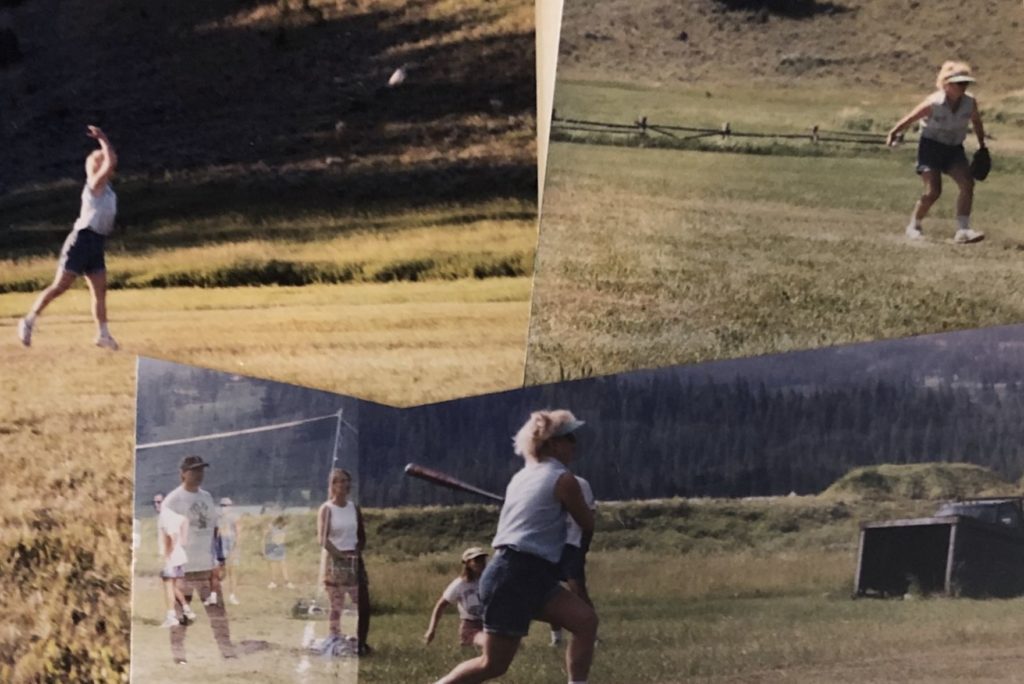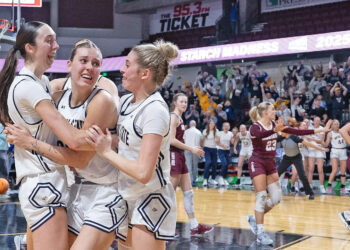By Brandon Walker EBS LOCAL EDITOR
BIG SKY – Before there were two fields, before the three-time defending tournament champion Lone Peak Caregivers Golden Goats existed, before the Big Sky softball league became what it is today—it all started with a flyer.
Four or five flyers to be exact, according the first commissioner of the league Bart Mitchell. After relocating to Big Sky in the fall of 1999, Mitchell—fueled by his own passion for the game—decided in the summer of 2000 to bring softball to Big Sky.
“I wanted to play and by organizing a league, it’s more reliable than just calling your friends to meet me because there’s always someone who doesn’t show,” he said.
However, this wasn’t the first taste of the game with the fluorescent yellow, grapefruit sized ball for the Big Sky community. In 1997 and 1998, fundraiser softball and volleyball tournaments were held by the Ophir School Club to benefit the school district in conjunction with the annual pie auction. In the inaugural tournament of 1997, roughly six teams competed and the Ophir School softball team reigned victorious, while Lone Mountain Taekwondo captured the volleyball tournament championship.
After a year break without the OSC fundraiser softball tournament, Mitchell arrived on the scene from Crested Butte, Colorado and gave the Big Sky community a metaphorical shot in its softball arm. He coordinated with Brian Wheeler, who oversaw the use of the softball field at the time, receiving permission to hang flyers and move ahead with his plan of creating an organized softball league.
“I mean I’m the guy that put up the flyers, but it was all those people that showed up the first night that said, ‘Hey, we want to play,’ that started it,” he said. “… I mean I think it’s a Big Sky thing. People give me too much credit, we’ll put it that way.”
That ‘first night’ Mitchell referred to drew enough participants for four complete softball teams. Before everyone departed for the evening, Mitchell suggested the idea of forming a softball league with a set schedule and teams that would play throughout the summer. His proposal was met with resounding support and the Big Sky co-ed softball league was born.

Playing on a lone field, situated in the same location as the current fields, but oriented in the opposite direction, those four teams—the Cab Lizards, Milkies, Big Sky Resort and the Master Batters, also known as the Hilbilly Huckers—battled it out in the league’s infancy. With no league or tournament championship held in the first season, the Master Batters were crowned the first ever champions in 2001.
In 2003, Mitchell said the popularity of the league began to blossom, attracting more players and teams. With the league’s expansion and the community’s seasonal work environment came a wave of new athletes.
“It was the old school Big Sky and I mean the people who’ve lived here a long time, the married people. The average age wasn’t as young as it was now,” Mitchell said. “… As it grew it got to be more of the seasonal people playing, you know the younger people.”
Jean Palmer, a board member of the Big Sky softball committee has been involved in Big Sky softball since the fundraiser tournaments. You may recognize her if you’ve taken in a ball game, manning the controls of the automated scoreboards each night of the week. She recalled that more women participated when softball was new to Big Sky and that the level of competitiveness was not nearly as high as it is today.
“The level of play has gotten way better and every year it gets better so, there’s really no easy games anymore,” said Lee Horning the commissioner of the Big Sky softball league for five seasons. “Every team is competitive and I think everybody has fun.”
The league’s budding popularity eventually led to the need for an additional playing surface and in 2011, the league paused for a season while the current set of fields were under construction—no champion was crowned; no season was held. New scoreboards accompanied the implementation of the new fields.
Horning, the league commissioner from 2015 to 2019, arrived on the Big Sky softball scene in 2008 from Minneapolis, Minnesota. An avid softball player, he immediately joined the league, playing for Big Sky Resort. At that time, his current team—the Hillbilly Huckers—was a dominant force. They won league championships in 2007, 2008, 2009 and went on for another three-peat from 2012 to 2014.
Throughout the years that Horning has participated he has seen vast improvements in the game, including the introduction of the 1-1 starting count for batters to improve pace of play. Additionally, Horning said the league implemented the use of a time clock to keep games on schedule. Games are currently allotted 61 minutes before they will be halted, if they are not complete. He applauded the softball committee’s efforts and noted that the assistance of the Big Sky Community Organization has helped the league make great strides.

“They really progressed it from a dirt league to a pretty respectable league—almost comparable to some other cities … even though we don’t have the funds or the parks department to take care of it,” Horning said.
To this day, the Cab Lizards, Milkies, Big Sky Resort, and the Hilbilly Huckers remain from the inaugural season of 2000. Each team has had their shining moments over the years, with the Resort winning a tournament championship, the Lizards capturing three of their own, but it is the Huckers who have dominated the podium throughout the years. Since their days as the Master Batters, the Huckers have won 11 league championships and four more tournament crowns.
Having only missed the 2011 season since its inception, the fate of the 2020 Big Sky softball league season hung in the balance this spring. Organizers were unsure if holding a season was possible due to the COVID-19 pandemic.
“It was kind of hard to determine if this was actually going to happen, but we knew if we didn’t do it that there wasn’t going to be anything going on, so we were really, really stoked that we were able to make it happen because so many people actually are a part of the Big Sky softball organization, so we wanted to be able to fulfill the needs of the community as well,” said Whitney McKenzie the chairman of the Big Sky softball league committee.
In coordination with BSCO, league officials introduced health guidelines for the 2020 season that teams were required to follow. They also installed sanitation stations in the dugouts, allowing athletes to maintain cleanliness throughout play.
“As a small town we all band together when we need to and understand that sometimes we have to follow rules that we don’t really like, but people are understanding and they really have done a great job down there,” McKenzie said.
While the season was shortened—each team participated in eight regular season contests as opposed to 13 games for teams last season—the Big Sky summer staple proceeded without a hitch. In an effort to lessen the number of people congregating at the fields, two games were played per night rather than the usual four that took place simultaneously in previous years.
“I think for the overall mental well-being of people and just a physical outlet, I think it was good that they got the season going,” Horning said.
For a small community, enthusiasm is never in short supply on the Big Sky softball diamonds. That enthusiasm and community is what keeps one member of the softball committee coming back year after year.
“The people, the kids playing, the adult children playing,” Palmer said. “… I think that’s what keeps me coming back definitely. It’s just so much fun to see the camaraderie with everybody and I mean everybody has their own team, but everybody cheers for each other’s team too, which is really kind of cool.”
Currently, the 2020 season is winding to a close. Teams were split into two divisions for the first time in league history and the league championship will showcase top seed from each division this year. The Huckers and the Golden Goats will square off for the 2020 league championship on Aug. 27 at 7 p.m.
The league tournament will take place the following week as the top eight teams battle in a single elimination tournament for bragging rights.












